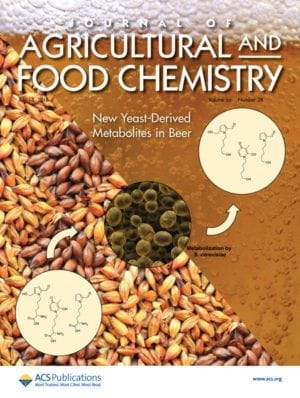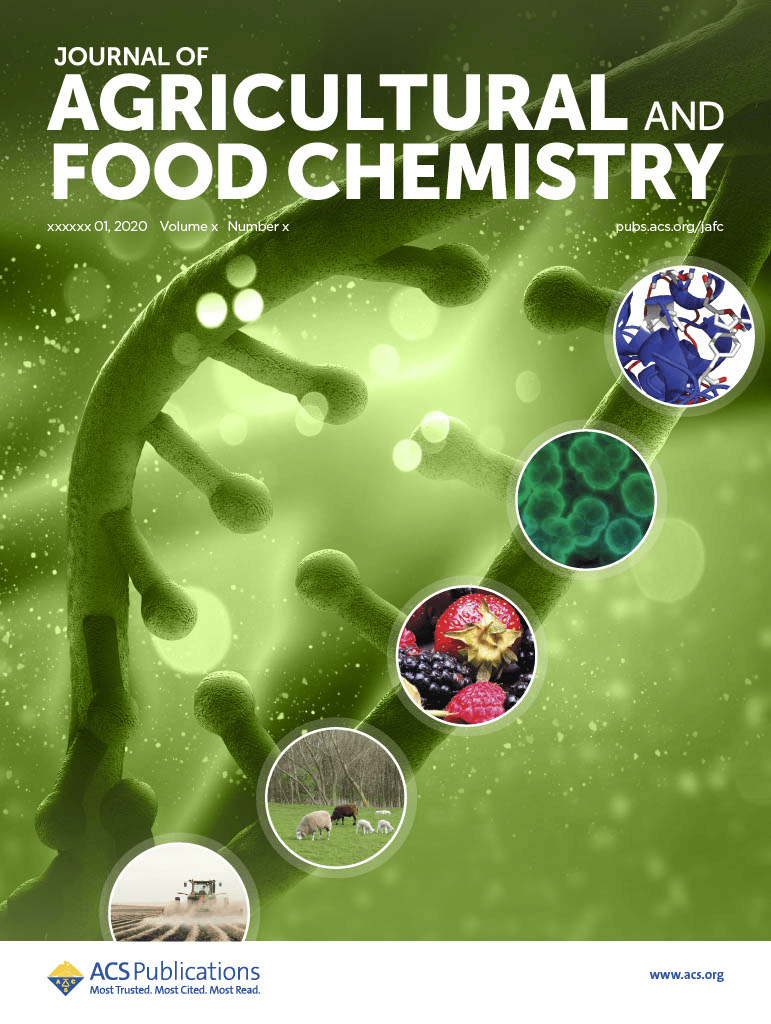The Journal of Agricultural and Food Chemistry (JAFC) and the ACS Divisions of Agrochemicals (AGRO) and Agricultural and Food Chemistry (AGFD) are pleased to announce the winners of the Research Article of the Year Award Lectureship. AGRO Best Paper: Bioactivity-Guided Metabolite Profiling of Feijoa (Acca sellowiana) Cultivars Identifies 4-Cyclopentene-1,3-dione as a Potent Antifungal Inhibitor of […]

The Journal of Agricultural and Food Chemistry (JAFC) and the ACS Divisions of Agrochemicals (AGRO) and Agricultural and Food Chemistry (AGFD) are pleased to announce the winners of the Research Article of the Year Award Lectureship.
AGRO Best Paper:
Bioactivity-Guided Metabolite Profiling of Feijoa (Acca sellowiana) Cultivars Identifies 4-Cyclopentene-1,3-dione as a Potent Antifungal Inhibitor of Chitin Synthesis
J. Agric. Food Chem., 2018, 66 (22), pp 5531–5539
DOI: 10.1021/acs.jafc.7b06154
AGFD Best Paper:
Yeast Metabolites of Glycated Amino Acids in Beer
J. Agric. Food Chem., 2018, 66 (28), pp 7451–7460
DOI: 10.1021/acs.jafc.8b01329

The awards will be presented at the Fall 2019 ACS National Meeting & Exposition in San Diego. Each award consists of an honorarium, a plaque, and travel expenses to the ACS National Meeting. Each recipient will give an invited talk as part of each division’s regular sessions.
Thank you to the Editorial Advisory Board and the JAFC Associate Editors who nominated articles for the 2019 awards, and congratulations to this year’s award recipients. We hope to see many of our readers and authors at the Fall 2019 ACS National Meeting in San Diego.
Dr. Andrew Munkacsi (AGRO Award Winner)
Dr. Andrew Munkacsi is a Senior Lecturer at Victoria University of Wellington in New Zealand. He received his Ph.D. in 2005 in Plant Biology from the University of Minnesota, where his thesis investigated the evolutionary history and population genetics of smut fungi that infect agricultural crops. He was then a Postdoctoral Fellow and Associate Research Scientist in the Department of Pediatrics at Columbia University Medical Center until 2012, where he investigated the genetics, cell biology and biochemistry of human diseases associated with defective lipid metabolism. Currently, his laboratory integrates bioactivity-guided metabolomics and functional genomics to isolate, identify and characterize antifungal compounds from agricultural crops and traditional medicines in Samoa and New Zealand, with the goal to treat fungal infections in plants, animals and humans.
Professor Thomas Henle (AGFD Award Winner)
Professor Thomas Henle studied Food Chemistry and received his Ph.D. in 1991 and his habilitation in 1996 from Technische Universität München. Since 1998, he is full professor and head of the Institute of Food Chemistry, Technische Universität (TU) Dresden, Germany. He had declined offers for professorships at University of Münster (2001) and ETH Zürich (2007).
His research group is working on chemical reactions of proteins, carbohydrates and lipids (glycation and lipation reactions) and related bio- and technofunctional consequences. Further research interests are nanoscaled materials in foods such as casein micelles, bioactive compounds and high-pressure treatment of food. Henle is Editor-in-Chief of the journal European Food Research and Technology and has authored and co-authored ca. 200 peer reviewed articles in international journals. Henle was president of the German Society of Food Chemistry from 2005 to 2010. He is currently a member of several scientific advisory boards (e.g. Dairy Industry Association, Federal Institute of Food and Nutrition), and he is an appointed member of Senate Commission on Food Safety (SKLM) of the German Research Foundation (DFG).
Being responsible for most of the organizing and teaching within the course of study in food chemistry at TU Dresden, Henle has supervised about 400 master’s and 30 Ph.D. theses. Currently, Henle is Dean of the Faculty of Chemistry and Food Chemistry and Vice Dean of the School of Science at Technische Universität Dresden.
Dr. Michael Hellwig (AGFD Award Winner)
Dr. Michael Hellwig studied Food Chemistry between 1999 and 2004 at Technische Universität Dresden. After his second state examination in Münster (Germany) in 2006, he joined Profesor Thomas Henle’s research group in Dresden and obtained his Ph.D. in 2011. He is currently employed as a principal investigator. Hellwig’s research interests include mechanisms and analysis of protein oxidation and glycation (Maillard reaction) in food and physiological systems as well as the impact of the respective reaction products on microorganisms and human physiology.
He has authored and co-authored 35 peer reviewed articles in international journals and co-supervised more than 35 master theses.
Previous Award Winners:
2018
Identification of the Ubiquitous Antioxidant Tripeptide Glutathione as a Fruit Fly Semiochemical
J. Agric. Food Chem., 2017, 65 (39), pp 8560–8568
DOI: 10.1021/acs.jafc.7b03164
Xavier Cheseto, Donald L. Kachigamba, Sunday Ekesi, Mary Ndung’u, Peter E. A. Teal, John J. Beck, and Baldwyn Torto
A Search for CD36 Ligands from Flavor Volatiles in Foods with an Aldehyde Moiety: Identification of Saturated Aliphatic Aldehydes with 9–16 Carbon Atoms as Potential Ligands of the Receptor
J. Agric. Food Chem., 2017, 65 (31), pp 6647–6655
DOI: 10.1021/acs.jafc.7b01890
Satoshi Tsuzuki, Takahiko Amitsuka, Tatsuya Okahashi, Yusaku Kimoto, and Kazuo Inoue
2017
Quantitation of Aristolochic Acids in Corn, Wheat Grain, and Soil Samples Collected in Serbia: Identifying a Novel Exposure Pathway in the Etiology of Balkan Endemic Nephropathy
J. Agric. Food Chem., 2016, 64 (29), pp 5928–5934
DOI: 10.1021/acs.jafc.6b02203
Wan Chan, Nikola M. Pavlović, Weiwei Li, Chi-Kong Chan, Jingjing Liu, Kailin Deng, Yinan Wang, Biljana Milosavljević, and Emina N. Kostić
Toxicologically Relevant Aldehydes Produced during the Frying Process Are Trapped by Food Phenolics
J. Agric. Food Chem., 2016, 64 (27), pp 5583–5589
DOI: 10.1021/acs.jafc.6b02165
Rosario Zamora, Isabel Aguilar, Michael Granvogl, and Francisco J. Hidalgo
2016
Oxyphytosterols as Active Ingredients in Wheat Bran Suppress Human Colon Cancer Cell Growth: Identification, Chemical Synthesis, and Biological Evaluation
J. Agric. Food Chem., 2015, 63 (8), pp 2264–2276
DOI: 10.1021/jf506361r
Yingdong Zhu, Dominique Soroka, and Shengmin Sang
Olfactory Cues from Different Plant Species in Host Selection by Female Pea Moths
J. Agric. Food Chem., 2015, 63 (8), pp 2127–2136
DOI: 10.1021/jf505934q
Gunda Thöming and Hans Ragnar Norli
2015
NMR-Based Metabolomic Investigation of Bioactivity of Chemical Constituents in Black Raspberry (Rubus occidentalis L.) Fruit Extracts
J. Agric. Food Chem., 2014, 62 (8), pp 1989–1998
DOI: 10.1021/jf404998k
Liladhar Paudel, Faith J. Wyzgoski, M. Monica Giusti, Jodee L. Johnson, Peter L. Rinaldi, Joseph C. Scheerens, Ann M. Chanon, Joshua A. Bomser, A. Raymond Miller, James K. Hardy, and R. Neil Reese
Identification of Plant Metabolites of Environmental Contaminants by UPLC-QToF-MS: The in Vitro Metabolism of Triclosan in Horseradish
J. Agric. Food Chem., 2014, 62 (5), pp 1001–1009
DOI: 10.1021/jf404784q
André Macherius, Bettina Seiwert, Peter Schröder, Christian Huber, Wilhelm Lorenz, and Thorsten Reemtsma
2014
Different Phenolic Compounds Activate Distinct Human Bitter Taste Receptors
J. Agric. Food Chem., 2013, 61 (7), pp 1525–1533
DOI: 10.1021/jf304198k
Susana Soares, Susann Kohl, Sophie Thalmann, Nuno Mateus, Wolfgang Meyerhof, and Victor De Freitas
Antifungal Activity against Plant Pathogens of Metabolites from the Endophytic Fungus Cladosporium cladosporioides
J. Agric. Food Chem., 2013, 61 (19), pp 4551–4555
DOI: 10.1021/jf400212y
Xiaoning Wang, Mohamed M. Radwan, Amer H. Taráwneh, Jiangtao Gao, David E. Wedge, Luiz H. Rosa, Horace G. Cutler, and Stephen J. Cutler
2013
Identifying New Lignin Bioengineering Targets: Impact of Epicatechin, Quercetin Glycoside, and Gallate Derivatives on the Lignification and Fermentation of Maize Cell Walls
J. Agric. Food Chem., 2012, 60 (20), pp 5152–5160
DOI: 10.1021/jf203986a
John H. Grabber, Dino Ress, and John Ralph
Human Psychometric and Taste Receptor Responses to Steviol Glycosides
J. Agric. Food Chem., 2012, 60 (27), pp 6782–6793
DOI: 10.1021/jf301297n
Caroline Hellfritsch, Anne Brockhoff, Frauke Stähler, Wolfgang Meyerhof, and Thomas Hofmann
